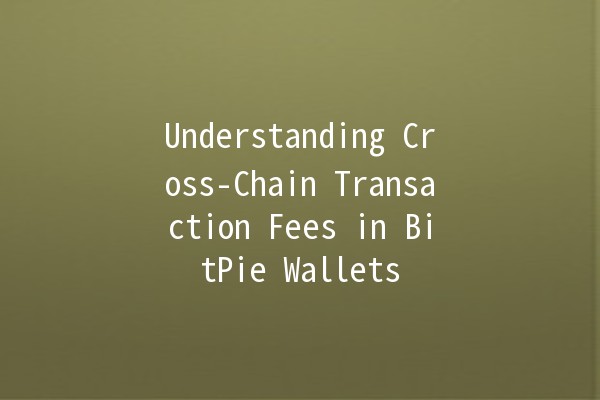




In the rapidly evolving world of cryptocurrencies, the ability to transfer assets across different blockchain networks has become essential for users. BitPie Wallet, a popular multicurrency wallet, offers crosschain transaction capabilities, allowing users to send and receive various cryptocurrencies seamlessly. However, understanding the associated transaction fees is crucial for optimizing the usage of this wallet. In this article, we'll delve into the specifics of crosschain transaction fees in BitPie Wallet, providing practical advice and tips to make informed decisions.
Crosschain transactions refer to the ability to transfer tokens or cryptocurrencies from one blockchain to another. This is significant because many cryptocurrencies operate on separate blockchains, each with its unique rules and protocols. BitPie Wallet enables users to facilitate these transactions via atomic swaps or smart contracts, further enhancing their cryptocurrency experience.
Before diving into the fees associated with crosschain transactions, it’s essential to understand why these fees exist. Every blockchain requires its miners or validators to process transactions, which incurs costs. Therefore, when transferring assets across chains, users need to pay fees on both chains involved in the transaction. These fees can vary significantly based on network congestion, the cryptocurrency being transferred, and other factors.

Network fees, also known as miner fees, are the fees paid to the miners or validators who process transactions on a blockchain. In BitPie Wallet, users must account for the network fees of both the sending and receiving blockchains during a crosschain transaction.
Fee Structure: The fee amount typically fluctuates based on network congestion. For instance, during times of high activity, fees may spike.
If you are transferring Bitcoin to Ethereum using BitPie Wallet, you will be charged a Bitcoin network fee as well as an Ethereum network fee. It’s essential to check the current fees before making the transaction to avoid any surprises.
In some cases, crosschain transactions may be facilitated through exchanges that support multiple cryptocurrencies. If you're swapping tokens instead of a direct transfer, additional exchange fees may apply.
Rate of Exchange: Exchange fees can vary depending on the platform's policies, and they may also include a markup on the exchange rate.
If you want to exchange Bitcoin for Ethereum in your BitPie Wallet, the exchange service will charge fees for performing the swap, which can add to the overall cost of the transaction.
BitPie Wallet may also impose fixed transaction fees for certain operations, including crosschain transactions. These fees are predetermined and are charged irrespective of the transaction size.
Benefits of Fixed Fees: Fixed fees can provide clarity and ensure you're aware of costs upfront.
Depending on whether you are using additional services integrated within BitPie Wallet (like DeFi protocols or staking options), there may be additional service fees.
Decentralized ance (DeFi): If using DeFi features, always check whether transaction fees are incorporated or separate.
Understanding how to minimize transaction fees can enhance your overall cryptocurrency experience. Here are five practical tips:
Explanation: Cryptocurrency networks often experience varying congestion levels based on time of day and market events.
Application: Monitor network conditions through various analytics platforms to find less congested periods to execute your transactions for lower fees.
Explanation: Many wallets and exchanges provide fee estimators that calculate the expected fees based on current network conditions.
Application: Use BitPie Wallet’s fee estimator to gauge optimal transaction fees before confirming your trades.
Explanation: Many wallets, including BitPie, allow users to adjust the transaction speed settings, impacting the transaction fees.
Application: If you're not in a hurry, choose slower transaction speeds to benefit from lower fees during nonurgent transactions.
Explanation: Instead of making multiple small transactions, consolidating them into a single large transaction may be more costeffective.
Application: Review your transaction history and find opportunities to combine smaller transactions into one to save on fees.
Explanation: The cryptocurrency landscape is dynamic, with fees changing frequently due to market fluctuations or protocol upgrades.
Application: Follow updates from BitPie Wallet and related news resources relevant to transaction fees, ensuring you are always aware of current fee structures.
Crosschain transaction fees are influenced by several factors, including network congestion of the blockchains involved, the transaction amount, the cryptocurrency being transferred, and current economic conditions in the cryptocurrency market.
To check transaction fees, users can navigate to the transaction interface within BitPie Wallet. Here, details about the expected fees based on current network conditions will be available before finalizing the transaction.
In most cases, if a transaction fails due to network issues or user error, the network fees will not be refundable, as they compensate miners for their work. However, users will need to confirm how BitPie Wallet handles such situations.
BitPie Wallet provides users with the ability to adjust transaction speeds, choose lowerpriority transactions, and utilize fee estimators. Additionally, community insights and tips can help users further minimize their fees.
While exchanges often provide competitive rates, the overall costs can vary widely based on market conditions, trading fees, and whether the exchange operates on a feefortrade model. Users should always compare the total costs, including hidden fees and spreads.
BitPie Wallet typically uses dynamic fee estimation based on current traffic. However, users can sometimes choose between different priority settings (e.g., low, normal, high) that implicitly set the fee amount.
Understanding crosschain transaction fees in BitPie Wallet is essential for managing your cryptocurrency effectively. By grasping the components that contribute to these fees and utilizing the tips provided, users can better navigate the complexities of crosschain transactions. Always stay informed about market conditions and specific wallet functionalities to make the most efficient choices regarding your cryptocurrency transfers. With the proper knowledge and strategies, you can optimize your fees and enhance your crypto experience.